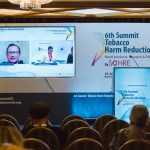The 6th Summit on Tobacco Harm Reduction concluded with a panel discussion between eminent THR experts representing their associations. Pannelists shared good practices, experiences and ideas; discussed strategies to raise awareness on existing knowledge and to explore how they can create new opportunities for the education of health policy experts, regulators, and the public; also, they commented on advocating for new research to generate more data, and for evidence-based policies.
The discussion was moderated by Mrs. Lina Nikolopoulou, SCOHRE Director and Professor Panos Vardas.
Although there is no doubt that smoking cessation and smoking prevention are the most valuable interventions to curve the smoking epidemic, Mrs. Nikolopoulou said, however, despite many years of efforts to persuade people to quit -or not to initiate- smoking, many people continue to smoke. SCOHRE was formed to connect people from all over the world, to share knowledge, and fight misinformation and misperceptions about smoking and harm reduction.
Tobacco Harm Reduction can be a very valuable tool for improving the health of people who are not able to stop smoking, Mr. Tim Phillips from ECigIntelligence said. THR is a rapidly evolving field and new data are generated, but we must always remember that we have to be sincere and share all our findings, both positive and negative. Gathering well-documented data, practices, and policies from all over the world is extremely important in order to persuade governments, regulators, policymakers and the public to accept the value of this strategy, and to help them conclude to the best decisions.
It’s not enough to generate data, we also have to find ways to bring the science and evidence on Tobacco Harm Reduction to those who need to hear it, Mrs. Jeannie Cameron, representative of the UK Vape Industry Association (UKVIA), agreed. Data must reach to policymakers, but these need to be translated in a way that they can understand it in order to help them make evidence-based decisions.
Although ‘Quit for Good’ Group considers complete smoking cessation as the gold standard, President Dr Lorenzo Mata said, we recognize the value of THR alternatives for adult smokers. In reality, the smoking habit is not going to disappear, since not all smokers can or want to stop smoking. Today, in Philippines there are about 14 million of tobacco cigarette smokers, and 170,000 deaths are attributed to smoking-related diseases annually. Therefore, there is a strong need to educate both adult smokers and medical experts on the science behind the less harmful smoke-free alternative to combustible tobacco products. THR strategies should be employed to reduce the huge burden of smoking, while of course we should be very careful to protect the minors and non-smokers.
Harm reduction is a global aim, Dr Emil Toldy-Schedel from the Hungarian Harm Reduction Scientific Association noted, but the focus point of harm reduction is different from country to country. In Hungary, he said, we are trying to focus on the medical harm reduction, with programs that promote for example healthy diet and programs for patients after a myocardial infarction or people with diabetes, and of course tobacco harm reduction. We also focus on sharing the knowledge about harm reduction by organizing medical meetings, as well as meetings with decision-makers and politicians to help them understand the meaning of harm reduction in order to use it in the future.
In UK, smoking remains the largest cause of preventable deaths, killing 64,000 people per year, Mrs. Mary Stamp, Trustee of the New Nicotine Alliance of UK, said, and in addition to the immense human suffering it has also a wide economic cost for NHS and the British society. But progress has been made in quitting, and we know that novel alternative non-combustible products have contributed to that progress, she added. In UK, it has been recognized that the government needs to embrace harm reduction methods. Since 2015, the Annual Reviews of Public Health England have consistently shown that vaping is 95% less harmful than smoking, while in 2017 it has been estimated that 50,000 smokers quit smoking using a vaping device. Of course, how the evidence is taken by parliamentarians is a very different issue, Mrs. Stamp noted, since often the science is too complicated, and they fail to understand it.
Collecting scientific evidence is of course fundamental, but today we see that there is a campaign against the existing evidence, Mrs. Cameron said, giving the example of snus. WHO’s campaign against harm reduction is well-funded and organized, she explained. But people need to have access and information about less harmful alternatives to combustible cigarettes products ―it is a matter of human rights, and an obligation of their governments.
SCOHRE recognizes that harm reduction is something that could make the lives of people better and has the ambition to try and get resources to build an Observatory of the smoking habit related to health outcomes in Europe, Mrs. Nikolopoulou said. Sharing knowledge, experiences, and practices is extremely important, since if we connect and collaborate, we can do more than each of us separately, she concluded.





